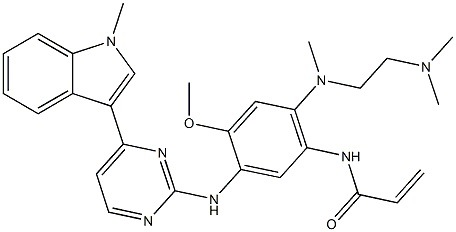Anticancer Azd-9291 (Mesylate) Osimertinib Base for for Lung Cancer
| Product Name |
AZD-9291 / Osimertinib  |
| Synonyms |
N(2{[2(diMethylaMino)ethyl](Methyl)aMino}4Methoxy 5{[4(1Methyl1Hindol3yl)pyriMidin2yl]aMino}phenyl)prop2enaMide; N-[2-[[2-(Dimethylamino)ethyl]methylamino]-4-methoxy-5-[[4-(1-methyl-1H-indol-3-yl)-2-pyrimidinyl]amino]phenyl]-2-propenamide;AZD9291,AZD-9291 Â |
| CAS |
1421373-65-0 Â |
| MF |
C28H33N7O2 Â |
| MW |
499.61 Â |
| Purity |
99% Â |
| Appearance |
White Powder  |
| Grade |
Pharma Grade  |
| MS |
 Â |
Application
AZD9291 administered once daily orally at 5Â mg/kg caused profound regression of tumours across EGFRm+ (PC9; 178% growth inhibition) and EGFRm+/T790M (H1975; 119% growth inhibition) tumour models in vivo,
after 14 days dosing. Furthermore 5 mg/kg AZD9291 was sufficient to cause significant shrinkage of EGFRm+ and EGFRm+/T790M transgenic mouse lung tumours. Tumour growth inhibition was associated with profound inhibition of EGFR phosphorylation and key downstream signaling pathways such as AKT and ERK. Chronic long-term treatment of PC9 and H1975 xenograft tumours with AZD9291 led to a complete and sustained macroscopic response, with no visible tumours after 40 days dosing, and being maintained beyond 100 days. Furthermore, pre-clinical data also indicates that AZD9291 could target tumours that have acquired resistance to the more recently identified HER2-amplification mechanism, thus potentially extending its benefit in TKI resistant patients.
Main Function
AZD 9291 is an irreversible inhibitor of epidermal growth factor receptor (EGFR) sensitizing and T790M
resistance mutations (IC50s = 15-17 nM) while sparing the wild-type form of the receptor (IC50 = 480 nM). It binds the related IGF1R and hERG receptors with significantly reduced potency (IC50s = 2.9 and 16.2 μM, respectively). AZD 9291 has been shown to inhibit tumor growth in a xenograft mouse model at oral doses of 5-10 mg/kg and has been tested clinically in patients with advanced EGFR mutant non-small-cell lung cancer.
Usage
Cell lines.Human lung cancer cells with EGFR-mutations or wild type EGFR stable expression

Â
| Product Name |
AZD-9291 / Osimertinib  |
| Synonyms |
N(2{[2(diMethylaMino)ethyl](Methyl)aMino}4Methoxy 5{[4(1Methyl1Hindol3yl)pyriMidin2yl]aMino}phenyl)prop2enaMide; N-[2-[[2-(Dimethylamino)ethyl]methylamino]-4-methoxy-5-[[4-(1-methyl-1H-indol-3-yl)-2-pyrimidinyl]amino]phenyl]-2-propenamide;AZD9291,AZD-9291 Â |
| CAS |
1421373-65-0 Â |
| MF |
C28H33N7O2 Â |
| MW |
499.61 Â |
| Purity |
99% Â |
| Appearance |
White Powder  |
| Grade |
Pharma Grade  |
| MS |
 Â |
Application
AZD9291 administered once daily orally at 5Â mg/kg caused profound regression of tumours across EGFRm+ (PC9; 178% growth inhibition) and EGFRm+/T790M (H1975; 119% growth inhibition) tumour models in vivo,
after 14 days dosing. Furthermore 5 mg/kg AZD9291 was sufficient to cause significant shrinkage of EGFRm+ and EGFRm+/T790M transgenic mouse lung tumours. Tumour growth inhibition was associated with profound inhibition of EGFR phosphorylation and key downstream signaling pathways such as AKT and ERK. Chronic long-term treatment of PC9 and H1975 xenograft tumours with AZD9291 led to a complete and sustained macroscopic response, with no visible tumours after 40 days dosing, and being maintained beyond 100 days. Furthermore, pre-clinical data also indicates that AZD9291 could target tumours that have acquired resistance to the more recently identified HER2-amplification mechanism, thus potentially extending its benefit in TKI resistant patients.
Main Function
AZD 9291 is an irreversible inhibitor of epidermal growth factor receptor (EGFR) sensitizing and T790M
resistance mutations (IC50s = 15-17 nM) while sparing the wild-type form of the receptor (IC50 = 480 nM). It binds the related IGF1R and hERG receptors with significantly reduced potency (IC50s = 2.9 and 16.2 μM, respectively). AZD 9291 has been shown to inhibit tumor growth in a xenograft mouse model at oral doses of 5-10 mg/kg and has been tested clinically in patients with advanced EGFR mutant non-small-cell lung cancer.
Usage
Cell lines.Human lung cancer cells with EGFR-mutations or wild type EGFR stable expression

Â